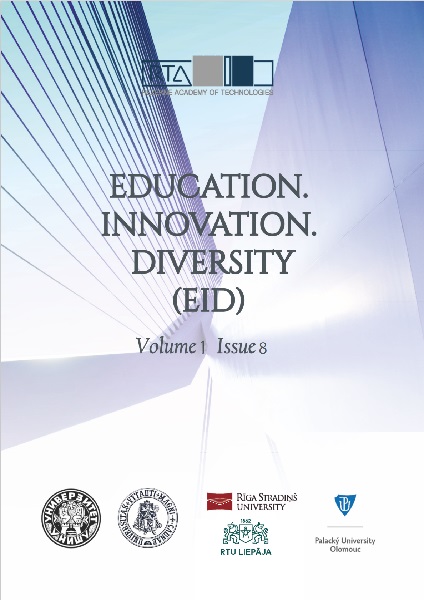THE ROLE OF SUPPORT GROUPS FOR THE DEVELOPMENT OF SOCIAL SKILLS IN THE SOCIAL WORK WITH FAMILIES WITH CHILDREN
DOI:
https://doi.org/10.17770/eid2024.1.7782Keywords:
social skills, support, social work, socialisation, family with childrenAbstract
In today's society, a person's ability to interact with society plays an important role - it depends on the social skills of each individual. This study reviews and cites several studies in Latvia and abroad, which indicate that families with children who lack knowledge and skills in raising children need to be educated, with special emphasis on the need to provide support as early as possible (early intervention) in order to prevent a significant lack of social skills in children in the future. The aim of this study is to investigate the social skills deficits of preschool children observed by social workers working with families with children, as well as the role and need for social skills support group activities in social work with families with children, by surveying social services in Latvian municipalities about the benefits of this social work method. The research uses theoretical and empirical research methods (structured questionnaire), data processing and analysis methods. The study concludes with findings on the causes of social skills gaps in families with children and the important role of support groups in social work with families with children in Latvia as an additional tool for social workers to help families with children integrate into society and develop these missing social skills.
References
Ajilchi, B., & Kargar, F. R. (2013). The Impact of a Parenting Skills Training Program on Stressed Mothers and Their Children’s Depression Level, Procedia-Social and Behavioral Sciences, 84, 450-456. DOI: https://doi.org/10.1016/j.sbspro.2013.06.583
Biedrība «Latvijas Sarkanais Krusts». (2019). Rokasgrāmata ģimeņu atbalsta grupu vadītājiem. Retrieved from https://www.redcross.lv/uploads/2019/12/rokasgr%C4%81mata-%C4%A3ime%C5%86u-atbalsta-grupu-vad%C4%ABt%C4%81jiem.pdf
Centrs Dardedze. (2021). Atbalsts izglītošanai atbalsta grupai “Sargeņģelis”. Retrieved from https://centrsdardedze.lv/projekti/aktualie-projekti/atbalsts-izglitojosajam-atbalsta-grupam-sargengelis/
Cimen, N. S., Kocyigit, A. (2010). Study on the Achievement Level of Social Skills Objectives and Outcomes in the Preschool Curriculum for Six Years Old, Procedia Social and Behavioral Sciences, Vol. 2, 5612-5618. DOI: https://doi.org/10.1016/j.sbspro.2010.03.915
Gurbuz, E. & Binnaz, K. (2018). Research of Social Skills of Children Who Attend to Kindergarten According to the Attitudes of Their Mothers. Journal of Education and Training Studies, 6 (3), 95 – 100. DOI: https://doi.org/10.11114/jets.v6i3.2831
Līdaka, A., Samuseviča, A. & Strazdiņa, I. (2018). Profesionālā pilnveide sociālajā darbā. Liepāja: LiePA.
Marinho - Casanova, M. L., & Leiner, M. (2017). Environmental influence on the development of social skills in children. Extensio: Revista Eletrônica De Extensão, 14(26), 2-11. DOI: https://doi.org/10.5007/1807-0221.2017v14n26p2
Marklund, K., Andershed, H. (2012). Nordic children Early intervention for children and families. Retrieved from https://nordicwelfare.org/wp-content/uploads/2018/02/5ENG_LR.pdf
Mendo - Lázaro, S., León Del Barco, B., Felipe-Castaño, E., Polo-del-Río, M. I., & Iglesias-Gallego, D. (2018). Cooperative team learning and the development of social skills in higher education: the variables involved. Frontie rsinpsychology, 9. DOI: 10.3389/fpsyg.2018.01536
Michelson, L., Sugai, D. P., Wood, R. P., & Kazdin, A. E. (1983). Social skills and child development. In social skills assessment and training with children. Springer (Pp. 1-11).
Ministru kabinets. (2023). Programma “STOP 4-7.” Retrieved from https://www.mk.gov.lv/lv/programma-stop-4-7
Robert Wood Johnson Foundation. (2015). How Children’s Social Skills Impact Success in Adulthood. Retrieved from https://files.eric.ed.gov/fulltext/ED592871.pdf
Stankus-Viša, I. (2015). Sociālais darbs ar grupu kā psihosociālā konsultēšana. In Psihosociālais sociālais darbs sistēmiskajā pieejā. Teorija un prakse (59-72). Jūrmala: Nodibinājum “C modulis”.
United Nations Educational, Scientific and Cultural Organization (UNESCO). (2021). Izglītība ilgtspējīgai attīstībai. Ceļvedis. Retrieved from https://www.unesco.lv/lv/media/331/download?attachment
Witt, L. A., Ferris G. R. (2003). Social Skills as Moderator of the Conscientiousness – Performance Relationship: Convergent Results Across Four Studies, Journal of Applied Psychology, Vol. 88, No. 1, 809-821. DOI: https://psycnet.apa.org/doi/10.1037/0021-9010.88.5.809
Downloads
Published
Issue
Section
License
Copyright (c) 2024 Education. Innovation. Diversity.

This work is licensed under a Creative Commons Attribution 4.0 International License.






